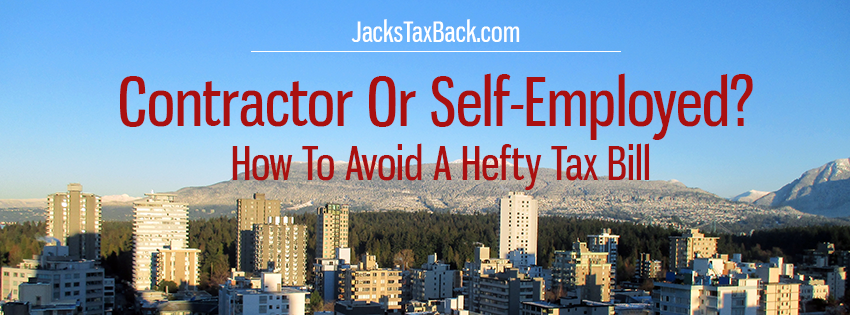Are You A Contractor Or Self-Employed? How To Avoid A Hefty Tax Bill

If you are not receiving a pay cheque showing income tax deductions, the chances are that you are building up a hefty income tax bill.
There is an increasingly common practice among certain small businesses, particularly within the construction sector, where they pay employees directly with a cheque or bank transfer, without first deducting tax contributions.
This is entirely legal, however, employees are often left in the dark when it comes to their tax responsibilities, therefore not putting aside a percentage of their pay cheque to cover their income tax at the end of the year.
Unfortunately, we have seen this scenario on a number of occasions, where workers have unwittingly been left with a large income tax bill. This can often coincide with the expensive process of applying for permanent residency in Canada, leaving them in a tough spot.
Here are some tips to help avoid being stuck with a hefty income tax bill, if you are being paid on a contractor or self-employed basis.
Tip 1: Find out your tax status
If you are unsure whether you are being paid on a contractor / self-employed basis, the first thing is to find out.
You can ask your employer directly, or the more reliable method is to request your detailed pay stub or summary of earnings. On this it should outline your income tax contributions, along with CPP, EI and other potential contributions, such as union dues.
If you’re still unsure, drop us a message and we can help provide assistance.
Tip 2: Request being put on the payroll
If you discover that you are being paid as a contractor, you can request that your employer pays you through payroll, with income tax, CPP and EI starting to automatically be deducted from your pay cheques.
Tip 3: Save a certain percentage of earnings
If your employer refuses to switch you to being paid through the method above, or you wish to remain on a contractor and self-employed basis, you can prepare for your tax bill by putting away a certain percentage of your earnings into a savings account.
Information regarding how much tax you are required to pay can be found on the CRA (Canada Revenue Agency) website, where it differs from province to province and depends on your tax bracket. More information on this is available on the CRA website: http://www.cra-arc.gc.ca/tx/ndvdls/fq/txrts-eng.html
Alternatively, feel free to contact us and we can help provide guidance on the amount of money you should be saving for your income tax bill.
Tip 4: Be aware of expenses you can claim
One of the benefits of being on a contractor / self-employed basis, is that it allows you to claim on a number of expenses, which you wouldn’t have been able to as a normal payroll employee.
This can drastically reduce your taxable earnings, meaning less tax for you to pay. There is a huge variety of expenses that can be claimed, such as vehicle use, phone bills and a certain portion of rent and hydro.
Tip 5: Hold onto receipts
Finally, don’t forget to hold onto your receipts, as CRA can audit your tax return at any time. If you are claiming expenses for a new car or laptop that you have bought, for example, ensure you keep the receipts to help lower your income tax bill.
For more information on contractor and self-employed tax returns drop us an email, we’re more than happy to help.
